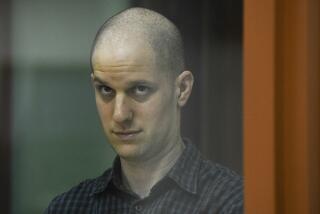Exhibit opens on trial of Russia tycoon
- Share via
Reporting from Moscow — The prosecutors rear out like gargoyles from the walls overhead, fingers jabbing into the air. The massive cartoon faces of witnesses, lawyers and defendants crowd the walls, words popping in balloons from their lips.
“Stand up!” commands a voice as visitors climb the stairs to the exhibition, invoking the opening moments of a trial. “The judge is coming.”
In a gutted perfume bottle factory on a nondescript street in downtown Moscow, an exhibit that opened Friday paints a fantastic, caricatured dreamscape of the continuing trial of former oil magnate Mikhail Khodorkovsky.
Inspired by cartoons that appeared on a Russian current affairs website, the exhibit is a political protest wrapped in the trappings of a gallery show.
“Why don’t you wake up this lady?” suggests a massive cutout of the judge. “Otherwise she’ll fall, and afterward they’ll say again that it’s boring.”
“The prosecutor has presented another curious document,” quips Platon Lebedev, Khodorkovsky’s business partner and co-defendant. “Want to have lunch?”
A tycoon who presided over the massive Yukos oil company and rose from the scrum of dawning capitalism to become Russia’s wealthiest man, Khodorkovsky is believed to have irritated the Kremlin by meddling in politics, promoting civil society and passing cash to opposition parties.
He was arrested in 2003, tried for tax evasion and fraud, and sent off to Siberia to serve an eight-year prison sentence. His former company was dismantled and sold at auction. Russians thought they’d heard the last of Khodorkovsky, at least for the time being.
But then prosecutors filed a fresh set of embezzlement and money laundering charges, and last year Khodorkovsky was fetched back from prison to stand trial again. He could face up to 22 years in prison if found guilty -- and his supporters predict that he will almost certainly be found guilty, because the government is determined not to let him go free.
Among those critical of the rule of Prime Minister Vladimir Putin, the second trial stirs deep cynicism. They dismiss it as a politically motivated farce, and say that, in the spectacle of Khodorkovsky’s persecution, the Russian government has shown its hardest side.
“It became clear that this was not just an actual trial of actual people, but a history of contemporary Russia,” said Anton Litvin, the exhibit’s curator. “On the one hand, they are real people deciding the fate of other real people. But the society around them is not the least bit interested.”
With the lurching and angled characters issuing their choppy statements, the exhibit is something like falling asleep after a heavy meal and suffering through a nightmare of endlessly bureaucratic court cases.
It’s meant that way -- which is why the organizers are on edge. Pacing in the melting ice outside the factory, Alexander Golts confesses that he’s nervous. Better known as a military analyst for the online Yezhednevny Zhurnal, Golts was a driving force behind the exhibition. He worries the government will find a way to shut it down.
How many Russians will see the exhibit? “God knows,” Golts sighed.
The idea of illustrating the trial dawned on the website last spring, as its journalists grappled with the depth, complexity and slow pace of the proceedings.
“It was clear that we could not deal with the trial in normal journalistic methods,” Golts said.
“You can’t write about it day after day. But we began to read the transcripts and we began to understand that cartoons are the best instrument.”
They hired artist Alexander Kotlyarov and began to run his cartoons once a week. Now, his images dangle ominously in rooms of exposed brick, graffiti-scarred walls and cold concrete floors.
There is the wall of witnesses, faces crammed together and testimony reading like a collective shrug.
“I don’t know.”
“No, only on TV.”
“Excuse me, what does it mean, ‘under what circumstances?’ ”
“I’m afraid I can’t answer the question because I don’t know them.”
The defense lawyers too occupy a wall, thundering against injustice.
“This is a showcase of what a judicial decision should not look like,” one barks. “It lacks legality, lacks grounds and lacks motive.”
At the far end of the room lurks the judge, gavel raised: “Is it funny? I’ll clear the room now!”
And there is, of course, Khodorkovsky himself, complaining about poor translations and logical inconsistencies in the court papers.
“Your honor, I don’t trust your impartiality,” he says. “Otherwise, as you are sufficiently qualified, especially in the economic sphere, you would have sent this case back.”
The people who funded the free exhibit don’t want their identity known. Golts will only say that the Khodorkovsky family is not among them.
“We felt the main strategy of prosecutors is to make the trial as dull as possible so that the public loses all interest,” Golts said. “So the idea is to keep people interested.”
More to Read
Sign up for Essential California
The most important California stories and recommendations in your inbox every morning.
You may occasionally receive promotional content from the Los Angeles Times.













